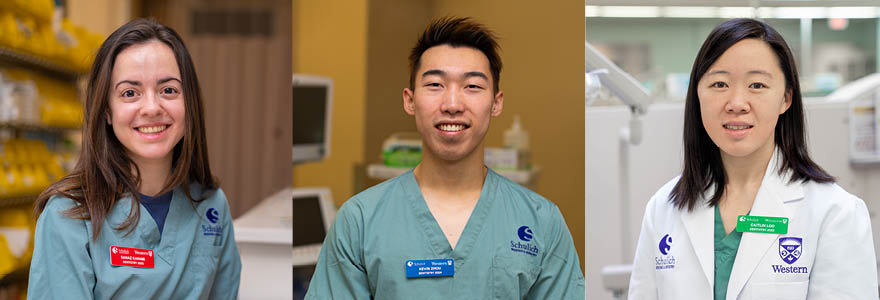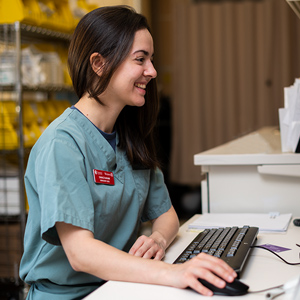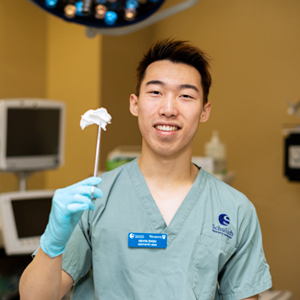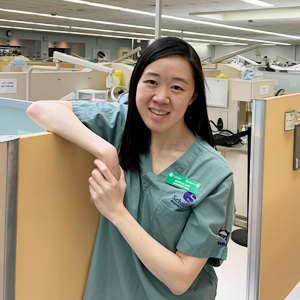Feature: Multidisciplinary research takes centre stage

Schulich Dentistry Research Day attracted more than 300 participants from across Canada and featured 22 student oral presentations in a range of research areas.
For Dr. Noha Gomaa, Assistant Professor and Associate Director for Dentistry Research, it was the diversity and multidisciplinarity of the research presented by the students that really stood out.
“I was really pleased to see the students presenting their research tackling oral health problems and solutions from different angles, including population oral health, medical biophysics, microbiology and immunology, and enriched education approaches,” she said. “I look forward to seeing more of this multidisciplinarity in the future.”
Sanaz Karami, Kevin Zhou and Caitlin Loo were just three of the students who received top awards from the day. Their projects illustrate the breadth and quality of ongoing learner research in Dentistry.
 Sanaz Karami, Dentistry Class of 2023
Sanaz Karami, Dentistry Class of 2023
With a passion for community outreach, Karami has been engaging with a community-based research project that aims to bring tele-dentistry to underserved and equity-seeking populations locally.
She says that COVID-19 opened her eyes to how tough it can be to maintain oral health when resources are scarce or access to them is limited. And it was this new perspective that made her curious to learn how tele-dentistry could fulfill these needs.
Her work is part of larger project designed to investigate the effectiveness of tele-dentistry in the diagnosis and provision of preventive dental care for low-income neighbourhoods in Southwestern Ontario. The goal behind her project is to provide a model for its implementation. In order to do this, she explored the benefits of tele-dentistry. Then, working with the research team, decided to perform an umbrella review to answer, what is the impact of tele-dentistry on oral health and oral health inequalities?
The umbrella review allowed them to compare results from systematic reviews and meta-analyses and compile a high-level overview on the subject to assist in use of this data for decision making.
Karami says that through research, she is developing skills that she will take with her into her career.
“By learning how to complete a review, I had the opportunity to develop my literature search skills, which will help me better engage with primary literature. This is a skill I will carry with me into my career, and one that I can use to maintain my clinical knowledge.”
 Kevin Zhou, Dentistry Class of 2024
Kevin Zhou, Dentistry Class of 2024
After seeing the devastating impact of maxillofacial defects on oncology and trauma patients, Zhou says he was inspired to integrate his interests in computer science and medicine for research. His goal is to help improve the precision and efficiency of reconstructive surgery.
Zhou’s most recent research project focuses on developing and validating a machine- learning model that is capable of predicting the premorbid shape of the craniofacial skeleton. This software essentially allows surgeons to digitally “fill in” maxillofacial defects with greater speed and precision than conventional methods, allowing for better virtual planning of the surgical reconstruction. By integrating artificial intelligence into preoperative planning, surgeons will be able to create more accurate and patient-centric treatment plans, thus reducing complications and improving post-operative outcomes.
Zhou, who represented the School at the CDA-Dentsply Student Clinician Research Program and received the 2022 Oral Health Award for outstanding leadership and research, says that his research is greatly enriching his experience as a learner.
“Integrating knowledge from our curriculum with personal extracurricular strengths to generate novel ideas is the ultimate challenge for a student, and I hope that this spirit of research can inspire all dental students to become science-driven clinicians,” he said.
 Caitlin Loo, Dentistry Class of 2022
Caitlin Loo, Dentistry Class of 2022
Loo says her interest in research on equity, diversity, and inclusion (EDI) stemmed from her work with the Student Professionalism and Ethics Association (SPEA). Today, she is a passionate advocate for improving access to care and when she came across the opportunity to get involved in research on EDI in dental education, she thought it would be a natural fit.
With her research, she wanted to learn more about the perspectives of dental students and faculty on implicit bias and explore how issues of implicit bias could be addressed in dental education. Through interviews, she gained a better understanding of how implicit bias affects the perceptions and interactions of those involved in dentistry and dental education.
“Being involved in this project has inspired me to seek out ways to break down barriers in dentistry and in my community,” said Loo. “Whether it’s with my own patients or on a broader scale, I hope to find opportunities to improve accessibility and equity in dentistry.”








